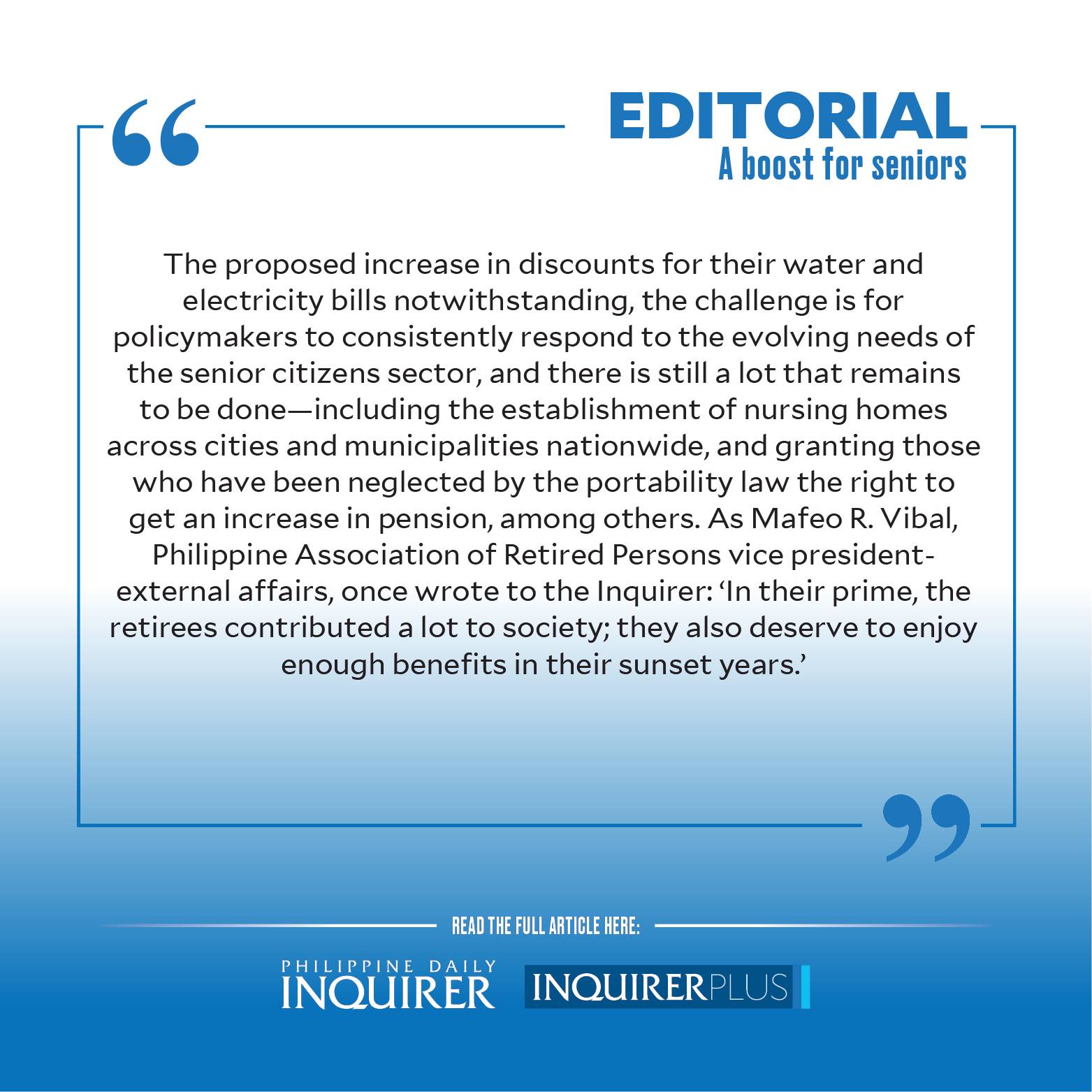
Here’s some good news for the country’s more than 12 million senior citizens: The House of Representatives this week has passed on final reading a bill increasing their discount on water and electricity bills and exempting these from value added tax (VAT). This will serve as much-needed boost for senior citizens who, just like majority of ordinary Filipinos, are experiencing a financial squeeze brought about by the pandemic’s economic hardships.
House Bill No. 10568 that seeks to amend Republic Act No. 9994 or the Expanded Senior Citizens Act of 2010 will increase from five to 10 percent the discount extended to seniors on their monthly utilities, provided that these are registered under their name. There is also a cap on the monthly consumption: 150 kilowatt hours for electricity and 30 cubic meters for water. The bill further provides that this privilege is granted per household regardless of the number of senior citizens residing there. Albay Rep. Joey Salceda, chair of the House committee on ways and means, said the measure contains a safeguard against abuse: “The measure explicitly states that the senior has to be living in the household subject to the exemptions and discounts.” The bill’s Senate counterpart is still pending at the committee level.
Senior Citizens party list Rep. Rodolfo Ordanes noted that this is not the only measure that the sector is pushing for and that lawmakers should continue giving institutionalized relief in basic social services. “This is our continuing response on rising to the challenge of coming up with important legislative initiatives that will significantly affect the lives of our marginalized elderly, and bridge their participation and access to the benefits of a sustained and improved quality of life,” Ordanes said.
The House special committee on senior citizens, which Ordanes chairs, also approved this week House Bill No. 8424 that mandates local government units to set aside at least one percent of their total budget to programs, projects, and activities exclusive for seniors. The sector accounts for about 11 percent of the country’s total population yet despite laws providing them with benefits, Ordanes said, a lot of senior citizens “languish from access to projects, programs and activities that are indispensable to their welfare due to non-appropriation of funds.”
But it is not just the lack of funding or access to projects and programs for seniors; many among them have complained in the past over the confusion or lack of understanding among business establishments, particularly pharmacies and restaurants, in extending these benefits provided by law. In a 2015 post on the website of the Philippine Association of Retired Persons (PARP), its founder and chair emeritus Amado F. Cabaero Sr. cited several instances where seniors were cheated of the discounts due them.
Among others, senior citizens enjoy the following privileges: 20 percent discount and VAT exemption on generic and brand medicines; on domestic air and sea travel, public railways, and public utility buses, jeepneys, and taxis; on hotel accommodation; on food, drinks and other consumable items in restaurants; and on admission fees in places such as theaters, cinemas, concert halls, parks, etc. They also enjoy a five percent discount on basic necessities i.e., rice, bread, and vegetables, as well as on prime commodities i.e., dairy products, toiletries, even on materials for house construction like hollow blocks and plywood.
“The senior citizen law [RA 9994] provides penalties on violation of the [law]. I wonder if any violator has actually been punished. It could be because senior citizens do not complain to assert their right to the discount or if cheated on their discount,” Cabaero wrote.
Other existing regulations, Ordanes previously noted, place health risks on senior citizens especially during the pandemic, such as the seven-day limit for over-the-counter drugs supply and one month for prescriptive medicines. Last December, the party list representative urged the Department of Health (DOH) to remove or suspend this limit because “senior citizens are put in a precarious situation where they are forced to increase their exposure to the public.” DOH has yet to respond to this request.
The proposed increase in discounts for their water and electricity bills notwithstanding, the challenge is for policymakers to consistently respond to the evolving needs of the senior citizens sector, and there is still a lot that remains to be done—including the establishment of nursing homes across cities and municipalities nationwide, and granting those who have been neglected by the portability law the right to get an increase in pension, among others.
As Mafeo R. Vibal, PARP vice president-external affairs, once wrote to the Inquirer: “In their prime, the retirees contributed a lot to society; they also deserve to enjoy enough benefits in their sunset years.”